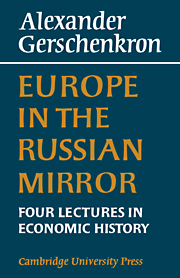Summary
The title of this series of lectures is broad and ambitious. Their actual subject matter is much more narrow and much more modest. Essentially, I should like to show what light, if any, is cast by the study of Russian economic history on some selected issues that have preoccupied students of Western economic history. This is a rather specific problem, to be illustrated by a couple of special cases. Yet, in dealing with it, I cannot avoid raising the question of what for want of a less heavy term may be called Europeanization of Russian economic history, thus placing the problem within a much wider framework and seeing it as an integral part of the old dichotomy: Russia and Europe, or rather Russia versus Europe.
Let me begin by saying that historically seen Russia was first and foremost a geographical concept and an ambiguous one at that. What was the landlocked mass of the immense Russian plains east of the Ural Mountains? Was it the backyard of Europe, or perhaps the wasteland behind Europe's backyard? Was it Europe at all? True, when I was a pupil in a Russian gymnasium more than half a century ago, we were taught that there was definitely such a thing as European Russia, the Ural Mountains being half in Europe and half in Asia, whereas the Caucasus surprisingly enough turned out to be altogether in Asia.
- Type
- Chapter
- Information
- Europe in the Russian MirrorFour Lectures in Economic History, pp. 1 - 22Publisher: Cambridge University PressPrint publication year: 1970



